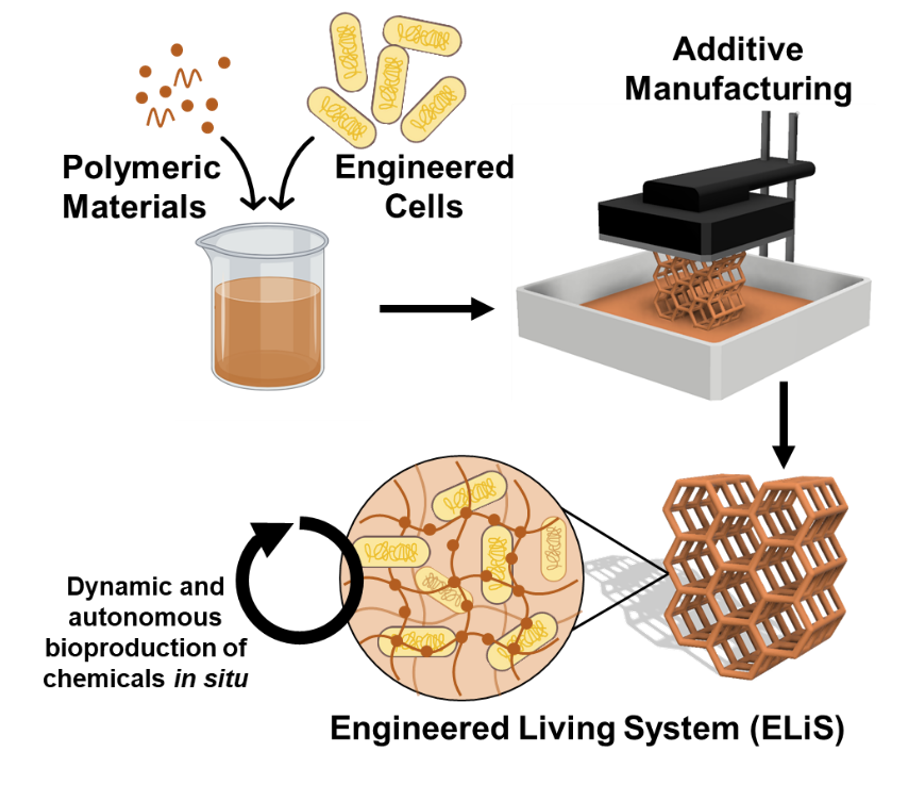EFRI ELiS: Autonomous Engineered Living Materials for Construction and Repair of Outdoor Built Environments.
Background
Trees and plants are exquisite examples of natural, living materials comprised of cells and polymers formed into 3D hierarchical assemblies and constructs. These systems can uniquely and autonomously grow, respond, protect, and self-repair. Humans have adopted these biocomposites – in the form of wood – and combined them with additional construction materials (steel, concrete, etc.) into building components to create their own built environment.
With advances in material science, we have for the first time the capacity to specify the functions and traits of materials and even endow them with living traits. This convergence of synthetic biology with polymer science has led to the rapid emergence of engineered living systems (ELiS), which we define in this project as composite materials of engineered cells encapsulated within a polymeric matrix. The living cells can serve as autonomous factories that dynamically control the production of proteins, carbohydrates, metabolites, and small molecules in response to pH changes, oxygen and light levels, and other cues (Figure 1).

Aim
Hydration plays a critical, distinctive role in deploying ELiS outside of the lab and into the built environment. Moreover, hydration is essential to all life; therefore we will investigate two primary specific conditions in this project to evaluate: (1) low and oscillating hydration ELiS that self-strengthen/repair by taking advantage of native fungal soil microbes that can be sustained with minimal water and (2) fully saturated hydroponic ELiS hydrogels that use capillary networks for transport and hydration to enable bio-sustained function and biocontainment of cyanobacteria and microbial co-cultures.
These conditions represent the two extremes we envision for deployment. There is great synergy between these two approaches that can be combined to create robust, condition-independent functions. A distinctive feature of this project is the integration of polymer chemistry, engineering, synthetic biology, fluid dynamics, and architecture to provide a holistic approach to the design, creation, and implementation of ELiS.
Approach and Methodology
The research strategy of this project combines pillars of fundamental knowledge contributed be the different research teams to develop enabling technologies that are robust and deployable in the built environment (Figure 2).

Outcomes
This project will develop approaches to the deployment of engineered living systems in the built environment. It will establish a genuine interaction between biology and material science and has the potential for a transformative impact of creating self-renewing and self-sustaining building materials—thus accessing new designs and features of the built environment. The transformative scientific aspects of our proposal are (1) genetic engineering of microorganisms for dynamic and extreme environments, (2) design and synthesis of mechanically stiff polymer hydrogels for 3D printing ELiS, and (3) the integration of capillary microfluidic channels for autonomous fluid transport. Additionally, 3D printing enables the distributed manufacturing of parts, as well as custom designs that can be created by architects, engineers, and other users. Our project will meet the national need for advanced manufacturing methods that are more sustainable built environments via reduced carbon footprint (reduced transport costs and greener production) and chemical circularity (chemical recycling of protein-based materials). The project also addresses the national need to develop the next generation of a highly skilled and diverse future workforce. Our outreach activities will increase awareness and adoption of biology in the architectural design stage.
Outreach and mentorship
The collaborators will embrace an interdisciplinary approach to teaching and mentorship. The project is interdisciplinary in nature and transcends microbiology, polymer science, chemical engineering, molecular biology, computational fluid dynamics, material science, and architecture. In doing so, we will uniquely enable synergistic research and interdisciplinary training across Chemical Engineering, Natural Sciences, Chemistry and Biochemistry, and Architecture. PIs will seek to recruit students from traditionally underrepresented groups in STEM and with diverse experiences/backgrounds. Key activities planned are (1) undergraduate research mentorship and work with REU students, (2) interdisciplinary research studios and design competition, and (3) tours and presentations available for the general public.
Funding
This project is funded by National Science Foundation (NSF), award #2223537, EFRI ELiS: Emerging Frontiers in Research and Innovation (EFRI-2022/23) Engineered Living Systems (ELiS).